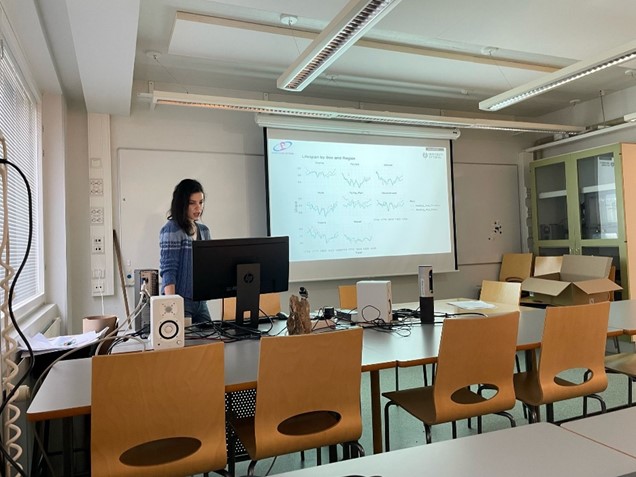Embarking on my PhD journey
Many might question whether or not to take on this journey, and different people can give different feedbacks, depending on their experiences, choices or just their opinions and what they have heard from others. the responses I’ve received have been as varied as the people giving them. Some enthusiastically congratulated me, while others pessimistically warned that I would regret leaving my job in public administration. Quite the contrast!
My family, on the other hand, was relaxed. Looking back, I appreciate the constructive freedom I was given growing up—my parents always encouraged me to make my own decisions early on.
Making the right choices is crucial, especially when embarking on something as challenging as scientific research. A PhD is more than just a job; it’s like raising a child—it needs constant care. Even when you close your laptop and go home, your mind remains occupied with it. Loving your research and believing in its significance keeps you motivated through the inevitable challenges. More importantly, a researcher’s contribution to society should stem from passion, not just a pay check. Aspiring researchers deserve support in pursuing careers that align with their hearts’ desires.
Since my school days, biology has been my passion—I knew it would accompany me throughout my life. As I progressed through university, my interest for human health and environmental causes grew stronger. Therefore, my early career started divided. As I completed my diploma thesis in public health, I diverged into working with different environmental projects.
A cornerstone of my professional development was my master’s degree in the International Masters in Applied Ecology. This program spanned four different countries, and was packed with so much experiences, that it made me feel like I could do anything after it. Most importantly, it allowed me to merge my two main research interests—environment and human health.
At the time I started my masters, in 2017 the European Union had issued a directive for its member states making it obligatory to include human health consideration in the Environmental Impact Assessment procedure. In 2018, I came across it as I was searching the scientific literature concerning the environmental impact on human health. I was fascinated and intrigued about knowing how the EU countries were implementing it. And as some say, you truly desire something, the universe has a way of aligning things for you.
The literature I was reading lead me to my future supervisor. He was an expert in the field and I spontaneously reached out to him introducing myself, my interest and asking if he could supervise me. I very soon received positive feedback, and right after an approval from the university since he was from a different University, not in EU anymore (you can imagine where :). Though we never met in person, I will always be immensely grateful for his support in my project idea, which made navigating my thesis a fulfilling experience.
After my master’s, I wasn’t eager to start a PhD. I could have asked my supervisor for an opportunity or continued at the university in Germany where I was at that time, but my interest in legislation concerning human health had run its course—I am, after all, a biologist. Plus, I didn’t know of any research groups working on my specific interests. My gut feeling was telling me to wait, to trust that the right project would come if I was meant to do a PhD.
From 2020 to 2024, I worked on several research projects, including at the National Institute of Seed and Seedling in Tirana. Then, one day, I saw an announcement for 25 PhD positions from UTU-GreDiT, a Marie Sklodowska Curie cofound programme. One project title caught my attention: Evolution of Human Health in Past and Present Environments from the Ecology and Evolutionary Ecology research group. It was as if someone had formulated my dream project! It caught me desiring to be the one selected for the project!
To cut a long story short—I applied, got selected, and started in mid-August. By November, I was already presenting my preliminary results at a group meeting, picture below.
In my research, I study how the environment affects human health, using longevity as a key health indicator. By examining longevity patterns across different spatial, temporal, and sex-based variations, I aim to identify the environmental factors influencing human lifespan.
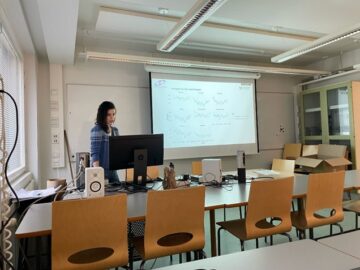
Presenting at the group meeting in Lammi research centre. Photo credits go to my colleagues Mark Spa (this guy is so smart; I have learned a lot from him!).
Moving to Finland, impressions and tips
The idea of doing my PhD in Finland was exiting. To me Finland was an exotic place, different from where I have lived before. What struck me most upon arrival was the abundance of green spaces. Turku, where I now live, is one of Finland’s major cities, yet it is surrounded by forests. Having a forest in walking distance from my apartment where I can go to pick mushrooms, berries and flowers felt surreal and thrilling. My flatmate, Leena, introduced me to foraging, and I can’t wait for summer to do it again! The beaches and landscapes of the archipelago are breath taking and well-preserved. Kudos to Finland for respecting nature more than any other nation I know! (See the photo below as proof.)
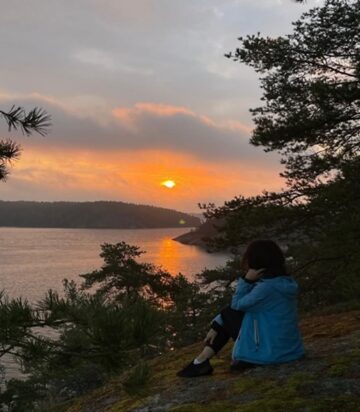
Picture from the archipelago in Seili Island, where I was presenting for the Human Diversity research consortium annual conference. Photo credits go to the same awesome college Mark Spa.
Finnish culture combines an appreciation for nature with a relaxed, open-minded attitude. It’s easy to feel comfortable here—even with supervisors—after spending time with them in the sauna, playing board games, or having coffee during meetings. I highly respect how approachable they are and how much time they dedicate to PhD students. In contrast to my previous research experiences, where I worked independently with minimal supervision, I now receive regular feedback during weekly meetings. This has accelerated my learning tremendously.
Accommodation
Comparing to countries I have lived before, especially to Germany it is much easier to rent a room or a single apartment in Finland (this impression of mine only applies to Turku, as I have no experience living in other cities of Finland). I found mine (a room in a shared apartment) through a page in Facebook (Vuokra-asunnot Turku). Accommodations outside the city centre are chipper and for those like me that like to live close to the forests, the connection to the public intercity transportation that here functions mainly with buses, is quite reliable.
Many apartments are rented unfurnished, and this can be challenging for foreigners. Know that there are places where you can get second hand furniture and more for free or for very cheap. Check Roskalava Turku in Facebook or tori.fi
Transportation
The Föli bus tickets can be purchased at R-kiosks, and a monthly ticked is worth it even if as an employed PhD you are not getting the student discount. Don’t expect much punctuality from the buses though! (If you come from Germany you are going to notice this:)). Also, R-kiosks serve multiple purposes—they act as post offices, convenience stores, and mobile subscription refill points.
Choosing a bank
When opening a bank account there are a few thinks worth considering, for example customer service. In some banks, you will need to book an appointment by phone call prior to visit the bank, is others this is not necessary. Also, the monthly fee differs, and some very competitive banks offer you accounts with 0 monthly fee and cards that can be used for discounts in certain supermarkets and other shops. I hope this advice might be helpful in choosing a bank, unfortunately, I cannot mention businesses!
Pro tip
If you have a foreign non-European driving licence, beware that you can convert it within your two years of residence in Finland, afterwards it is no longer possible.
Finding my circle
People from the department often organise fun get together activities. So much, that it is impossible to attend all. Still, I remember when I left my country, I was feeling sad to say goodbye to my Argentine tango friends. I would spend most of my free time with them. Finding likeminded people can make a huge difference in one’s life. To my surprise, I found a big and well organised Argentine tango community here in Turku and in Helsinki. I joined as soon as I arrived, and already have many beautiful shared moments. There are different dance associations here in Turku, if you are a fan of dancing or check Turku Together for fun workshops and meeting new people.
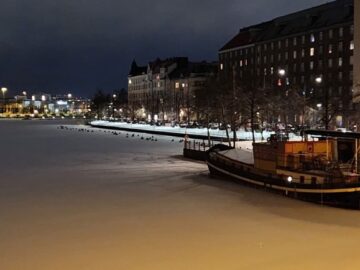
The charming view of Helsinki in a freezing winter night
By the way, how is coping with cold?
I came here expecting a harsh winter. Indeed, someone that has never been in Finland had already warned me with the words “it’s cold to death!”. It was 12 of August when I arrived welcomed from my exceptionally kind landlady who kindly picked me up from the airport. I had a wool blazer on, and it felt like autumn. But some days were quite warm and I even swam at Ruissalo, a beautiful island of Turku with beaches, forests, and a sauna, and can be easily reached with the intercity buses or bike.
But, back to the weather…
Everybody was saying that the winter has been quite mild this year (2024 – 2025). Indeed, the lowest temperature that I experienced has been -10°C. However, the coldest days ranging from -20 to -30 are rare, according to locals. And, you do not feel the cold if you wear appropriate clothing. I recommend wearing thermals under your sweaters and pants, and good isolated not slippery winter shoes. Whereas, the inside environments are warm enough to feel comfortable.
Now that I am writing this post, it is approaching the end of March. It is still cold, the temperatures range from -1 to 7, but the sun shines bright in my face, and I am not wearing anymore my shoe spikes or the winter gloves. The spring is here! 🙂
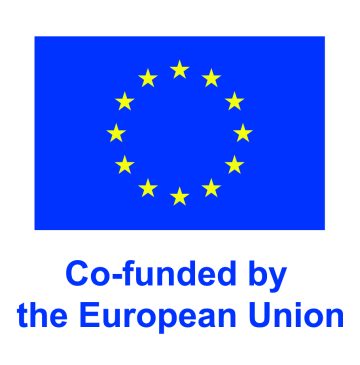 Co-funded by the European Union. Views and opinions expressed are however those of the author(s) only and do not necessarily reflect those of the European Union or European Research Executive Agency (REA). Neither the European Union nor REA can be held responsible for them.
Co-funded by the European Union. Views and opinions expressed are however those of the author(s) only and do not necessarily reflect those of the European Union or European Research Executive Agency (REA). Neither the European Union nor REA can be held responsible for them.
